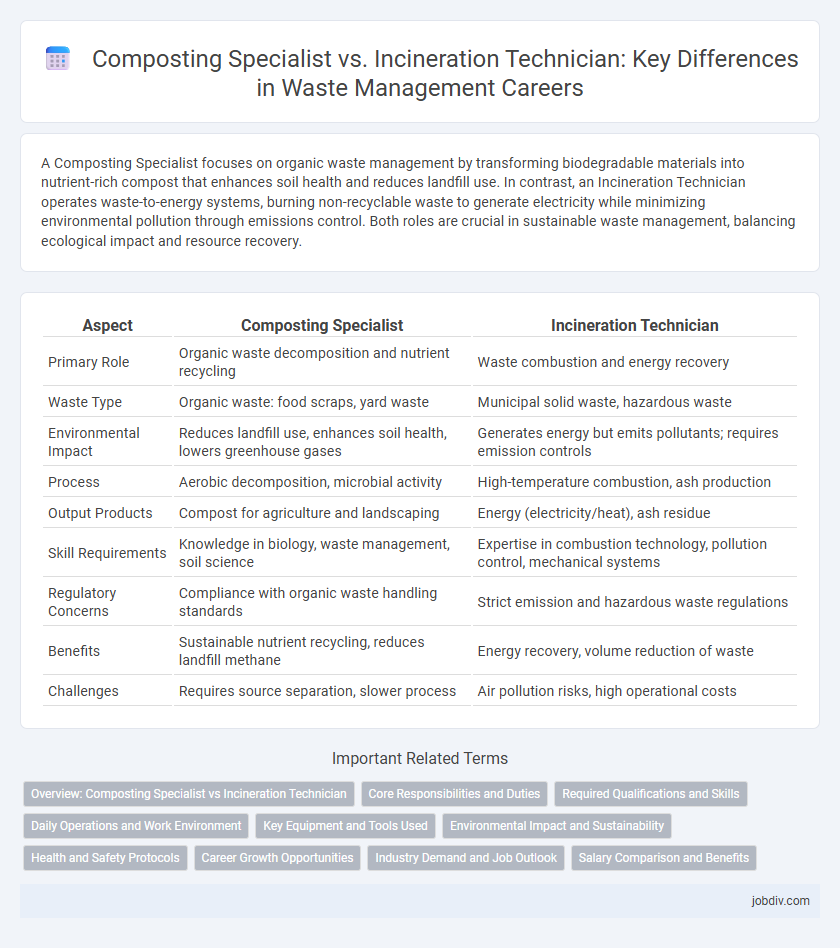A Composting Specialist focuses on organic waste management by transforming biodegradable materials into nutrient-rich compost that enhances soil health and reduces landfill use. In contrast, an Incineration Technician operates waste-to-energy systems, burning non-recyclable waste to generate electricity while minimizing environmental pollution through emissions control. Both roles are crucial in sustainable waste management, balancing ecological impact and resource recovery.
Table of Comparison
| Aspect | Composting Specialist | Incineration Technician |
|---|---|---|
| Primary Role | Organic waste decomposition and nutrient recycling | Waste combustion and energy recovery |
| Waste Type | Organic waste: food scraps, yard waste | Municipal solid waste, hazardous waste |
| Environmental Impact | Reduces landfill use, enhances soil health, lowers greenhouse gases | Generates energy but emits pollutants; requires emission controls |
| Process | Aerobic decomposition, microbial activity | High-temperature combustion, ash production |
| Output Products | Compost for agriculture and landscaping | Energy (electricity/heat), ash residue |
| Skill Requirements | Knowledge in biology, waste management, soil science | Expertise in combustion technology, pollution control, mechanical systems |
| Regulatory Concerns | Compliance with organic waste handling standards | Strict emission and hazardous waste regulations |
| Benefits | Sustainable nutrient recycling, reduces landfill methane | Energy recovery, volume reduction of waste |
| Challenges | Requires source separation, slower process | Air pollution risks, high operational costs |
Overview: Composting Specialist vs Incineration Technician
Composting Specialists manage organic waste decomposition through controlled biological processes, enhancing soil health and reducing landfill reliance. Incineration Technicians operate high-temperature combustion systems to convert waste into energy, minimizing volume but generating emissions requiring stringent controls. Both roles address waste management with distinct environmental impacts and technical skillsets focused on sustainability and regulatory compliance.
Core Responsibilities and Duties
Composting specialists manage organic waste transformation through aerobic decomposition, focusing on monitoring compost temperature, moisture, and aeration to ensure nutrient-rich soil production. Incineration technicians operate and maintain high-temperature combustion systems designed to reduce waste volume and neutralize hazardous materials, emphasizing emission control and regulatory compliance. Both roles require expertise in waste treatment processes, but composting specialists prioritize biodegradation, while incineration technicians concentrate on thermal waste destruction.
Required Qualifications and Skills
A Composting Specialist requires knowledge in organic waste management, soil science, and microbial processes, with skills in environmental monitoring and sustainable agricultural practices. An Incineration Technician must have expertise in combustion technology, air pollution control, and mechanical maintenance, along with skills in operating high-temperature incinerators and ensuring regulatory compliance. Both roles demand strong problem-solving abilities and adherence to environmental safety standards.
Daily Operations and Work Environment
A Composting Specialist manages organic waste through aerobic decomposition, ensuring optimal temperature, moisture, and oxygen levels in large-scale composting facilities to produce nutrient-rich soil amendments. An Incineration Technician operates high-temperature combustion systems to reduce waste volume and generate energy, constantly monitoring emissions and maintaining strict safety protocols in industrial settings. Both roles require adherence to environmental regulations and involve hands-on management of waste processing equipment, but Composting Specialists work primarily outdoors with biological material, while Incineration Technicians operate in controlled, often enclosed, high-heat environments.
Key Equipment and Tools Used
Composting specialists rely heavily on equipment such as aerators, shredders, and temperature monitors to efficiently break down organic waste into nutrient-rich compost. Incineration technicians operate advanced furnaces, flue gas treatment systems, and ash handling equipment to combust waste safely and reduce volume. Both roles require specialized tools to optimize waste processing while minimizing environmental impact.
Environmental Impact and Sustainability
Composting specialists promote environmental sustainability by converting organic waste into nutrient-rich soil, reducing landfill use, and lowering greenhouse gas emissions like methane. Incineration technicians manage waste through combustion, which decreases landfill volume but generates air pollutants and carbon dioxide, contributing to climate change. Composting aligns better with circular economy principles by enhancing soil health and supporting ecosystems, whereas incineration relies on energy recovery but poses challenges in emissions control and long-term environmental toxicity.
Health and Safety Protocols
Composting specialists implement strict health and safety protocols, including the use of personal protective equipment (PPE) to minimize exposure to bioaerosols and pathogens during organic waste processing. Incineration technicians adhere to rigorous safety measures to manage high-temperature equipment and control emissions, reducing risks of respiratory hazards and chemical exposure. Both roles require specialized training in handling hazardous materials and emergency response to ensure worker safety and environmental compliance.
Career Growth Opportunities
Composting specialists experience growing demand due to increasing environmental regulations and the global shift toward sustainable waste management, offering diverse career opportunities in municipal, agricultural, and commercial sectors. Incineration technicians have stable job prospects in regions reliant on waste-to-energy technologies, with potential advancement into plant supervision and environmental compliance roles. Both careers benefit from expanding green technology initiatives, but composting specialists often see more dynamic growth aligned with circular economy trends.
Industry Demand and Job Outlook
Composting specialists are experiencing increased industry demand due to rising environmental awareness and sustainable waste management practices, with job growth projected at 11% over the next decade. Incineration technicians face a steadier job outlook, as advancements in waste-to-energy technology maintain steady employment opportunities but encounter regulatory and environmental challenges. Both roles are critical in managing municipal solid waste, yet composting offers greater expansion potential in the green economy sector.
Salary Comparison and Benefits
Composting Specialists typically earn between $40,000 and $60,000 annually, focusing on sustainable organic waste management and soil health enhancement, which offers environmental benefits like reduced landfill use. Incineration Technicians receive salaries ranging from $50,000 to $70,000, working with waste-to-energy technologies that help reduce waste volume but may involve higher operational risks and environmental concerns. While Composting Specialists contribute to circular economy practices with lower health risks, Incineration Technicians benefit from higher wages and advanced technical skills in energy recovery systems.
Composting Specialist vs Incineration Technician Infographic

 jobdiv.com
jobdiv.com